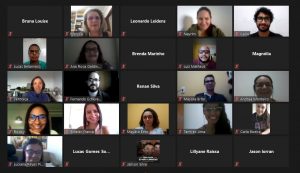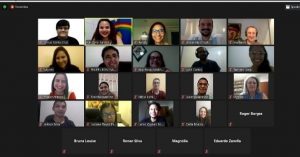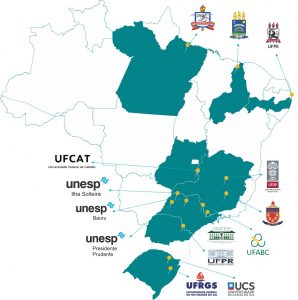
From September 5 to 7, 2020, a few dozen students and young researchers, together with some professors, dedicated the afternoons of the holiday of Brazil’s Independence Day to participate, online, in the 1st National Meeting of the B-MRS University Chapters (I ENUC).
The event brought together members of University Chapters (UCs) and people interested in meeting them. The program was built around two axes: the UCs’ presentations about their teams, institutions, actions carried out and future projects, and the invited lectures on topics of interest to the UCs.
ENUC emerged from the desire of the UC from the Federal University of Pernambuco (UFPE) to interact with members of other B-MRS UCs. In this first edition, the event was fully organized and carried out by the members of UC-UFPE.
UCs in action: learn by doing
In his lecture, Professor Newton Barbosa (UFPA), national coordinator of the UCs program reflected that in the scientific career being competent in the chosen area of knowledge is essential, but it is not enough, especially at the present moment in the history of science and technology, in which problem solving requires the interaction between people and areas. Skills such as communication, flexibility, and proactive leadership, he said, are also necessary for the researcher. The scientist explained that “the idea of the UCs program is precisely to help develop these skills, using the learn-by-doing method, with students carrying out team projects.”
“Research alone will not fill our CV,” added Karolyne Santos da Silva, president of UC UFPE. “We will also need to organize events, occupy administrative positions, publicize our work in society, among other things,” added the doctoral student, who was the event coordinator.
A wide range of projects carried out by the chapters were presented throughout the event, which covered from the creation of the unit’s logo and internal statute, to lectures and interviews for laypeople, workshops to motivate girls to work in science and technology, and seminars for researchers. Support for social action campaigns is also part of the activities carried out by the UCs, always with the dual objective of learning-by-doing and generating a positive impact on the environment.
The social impact of research

In one of the invited lectures, Professor Roberto Faria (IFSC-USP), who was president of B-MRS between 2012 and 2015, spoke briefly about the history of the UCs program. “I wanted the students’ greater participation in B-MRS, as they are the country’s greatest wealth for the future,” said the former president of B-MRS. Faria said that it all started in 2013, during his first term as president of B-MRS. At a scientific event in San Francisco (USA), Professor Faria spoke with the coordinator of the Materials Research Society (MRS) university chapters program, who was none other than Mildred Dresselhaus, a scientist internationally renowned for her work with carbon nanomaterials, who passed away in 2017. One year after this conversation, the B-MRS UCs Program was operating with 4 active units. Before ending his speech, Faria invited the members of the UCs to reflect on the relationship of materials research with the development of Brazil and the problems of Brazilians, to find solutions to the contradiction between the country’s natural wealth and the low quality of life of a large part of its population.
The social impact of the research was also addressed in a lecture by professor Eduardo Martinelli (UFRN), scientific director of B-MRS and coordinator of the Materials area at CAPES, the federal government agency, responsible for quality in undergraduate and postgraduate institutions in Brazil. Martinelli shared the work that CAPES has been doing to create metrics that objectively reveal the impacts generated by postgraduate courses on people’s quality of life. “Society invests in us, researchers, and we need to answer how we benefit society.” This concern also appeared in the presentations of the UCs, in actions aimed at showing laypeople the presence and importance of science in everyday life.
Diversity, representativeness and multidisciplinarity

With units in all Brazilian regions, members of different ethnic groups and a good proportion of women on the boards, the UCs program is very close to the ideal of diversity and representativeness. Thus, these two concepts were intensely debated throughout the event, starting with the opening lecture by professor Mônica Cotta (UNICAMP), president of B-MRS (the first woman to occupy this position in the Society). “It is not by chance that today we have two women at the opening of the meeting, the president of the Society and the event coordinator,” stated Professor Petrus Santa Cruz (UFPE), tutor of the UC -UFPE.
In the lecture, Professor Cotta also spoke about the role of scientific societies and, in particular, about the past, present and future of B-MRS. “For me, the future is related to university chapters, because it is their members who are able to better communicate with new generations,” she said. The president showed that the history of B-MRS is linked to the highly multidisciplinary nature of materials research, which requires merging the knowledge of physicists, chemists, biologists, engineers, medical doctors and other professionals.
Belonging to a generation more accustomed to a multidisciplinary approach, the members of the chapters naturally included the subject in their presentations, which showed the efforts by students from different areas of knowledge.
Results
The most evident result of the event was enabling each UC to get to know the other units. In the evaluation of the organizing team, the meeting allowed to reflect on the effectiveness of all projects, and the possibilities for adapting each action to the different realities of the country. “I highlight the exchange of experiences and ideas between the various UCs, which reflect the cultural plurality of Brazilian society and the various areas that compose the materials community,” says Professor Mônica Cotta, president of B-MRS, who participated in the entire event.
The I ENUC was also a generator of joint projects. “Without a shadow of a doubt, ENUC promoted in an unprecedented way the integration between the various UCs in our program, which can already be seen in practical terms with the organization of a cycle of webinars, which was a result of the event,” said Professor Newton Barbosa, national coordinator of the UCs Program, who also followed the event in its entirety.
In addition, the event provided a broader contact between the members of the program with the B-MRS board and with other people who work or have worked in the Society. “It was especially motivating to be able to observe the maturity, commitment and involvement of these students with the values we share at B-MRS and in the academic area in general, such as respect for science and scientific method, ethical values, diversity and representativeness in all aspects,” expressed the president of the Society.
Another important result of the I ENUC, according to Professor Barbosa, was to have perfected the idea of what it means to be a member of a B-MRS UC. “Being part of a chapter means, at a very young scientific age, participating in the discussions of macro problems of Materials Science and Engineering. Being able to think and propose, in a professional and respectful way, solutions to these problems. Go beyond the laboratory bench and become a professional with multiple skills,” summarized the program coordinator.
Communication and sponsorships
The event also featured a lecture by Verónica Savignano, responsible for Communications at B-MRS. The scientific journalist presented all the communication channels of B-MRS, their audiences and contents, in order to open interaction possibilities with the UCs. Speaking to a generation that is much more accustomed to dissemination (via social networks) than the previous generation, the journalist strived to generate a reflection on the criteria and guidelines (ethical, aesthetic and technical) that should guide the work of communication. During the questions, the discussion revolved around the concepts of disinformation, infodemics, pseudoscience and fake news.
Finally, in another invited lecture, Rosely Maier Queiroz, former financial director of UC-UFPE, shared a step-by-step on how to get sponsorship and manage the budget of UC projects, with specific tips for this time of pandemic and economic crisis.
Independence, Technology and Fight
“I think the date of this event is symbolic, as the independence of a country depends on technological independence,” said Professor Petrus Santa Cruz, when opening the meeting. “This year there is no Independence parade because of the pandemic, but there is a fight alert, the fight for education, for science, for the reduction of social inequalities,” said Karolyne, ending the event.
The event was recorded and is available on the UC-UFPE YouTube channel.
